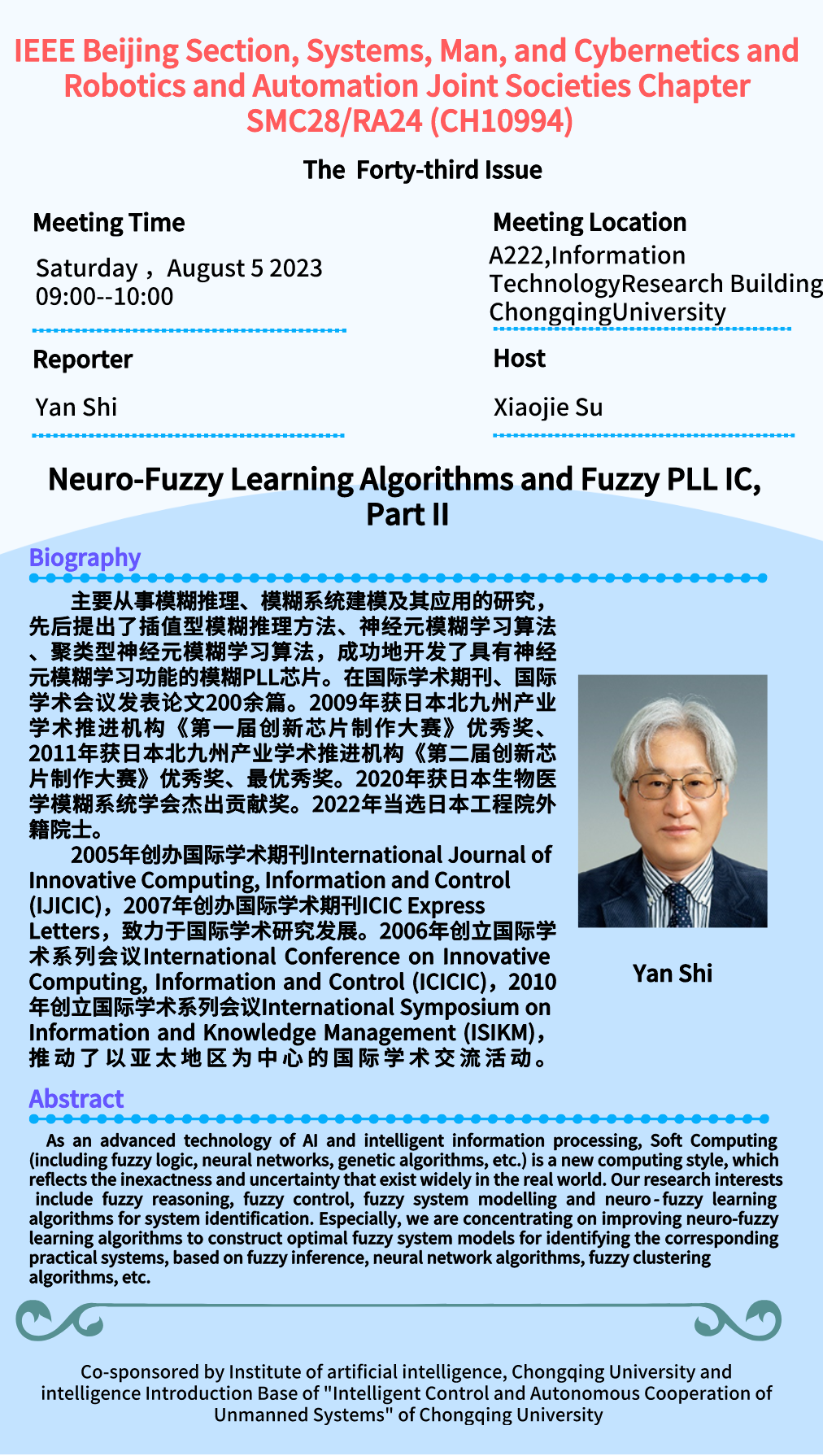Neuro-Fuzzy Learning Algorithms and Fuzzy PLL IC, Part II
The Forty-third Issue

As an advanced technology of Al and intelligent information processing, Soft Computing (including fuzzy logic, neural networks, genetic algorithms, etc.) is a new computing style, which reflects the inexactness and uncertainty that exist widely in the real world. Our research interests include fuzzy reasoning, fuzzy control, fuzzy system modelling and neuro-fuzzy learning algorithms for system identification. Especially, we are concentrating on improving neuro-fuzzy learning algorithms to construct optimal fuzzy system models for identifying the corresponding practical systems, based on fuzzy inference, neural network algorithms, fuzzy clustering algorithms, etc.
Date and Time
Location
Hosts
Registration
-
 Add Event to Calendar
Add Event to Calendar
- Contact Event Host
- Co-sponsored by Institute of Artificial Intelligence, Chongqing University and Intelligent Control and Autonomous Cooperation of Unmanned Systems 111 Project, Chongqing University
Speakers
 Yan Shi of 日本工程院
Yan Shi of 日本工程院
Neuro-Fuzzy Learning Algorithms and Fuzzy PLL IC, Part II
As an advanced technology of Al and intelligent information processing, Soft Computing (including fuzzy logic, neural networks, genetic algorithms, etc.) is a new computing style, which reflects the inexactness and uncertainty that exist widely in the real world. Our research interests include fuzzy reasoning, fuzzy control, fuzzy system modelling and neuro-fuzzy learning algorithms for system identification. Especially, we are concentrating on improving neuro-fuzzy learning algorithms to construct optimal fuzzy system models for identifying the corresponding practical systems, based on fuzzy inference, neural network algorithms, fuzzy clustering algorithms, etc.
Biography:
主要从事模糊推理、模糊系统建模及其应用的研究, 先后提出了插值型模糊推理方法、神经元模糊学习算法 、聚类型神经元模糊学习算法,成功地开发了具有神经元模糊学习功能的模糊PLL芯片。在国际学术期刊、国际学术会议发表论文200余篇。2009年获日本北九州产业学术推进机构《第一届创新芯片制作大赛》优秀奖、 2011年获日本北九州产业学术推进机构《第二届创新芯 片制作大赛》优秀奖、最优秀奖。2020年获日本生物医学模糊系统学会杰出贡献奖。2022年当选日本工程院外籍院士。 2005年创办国际学术期刊International Journal of Innovative Computing, Information and Control (IJICIC),2007年创办国际学术期刊ICIC Express Letters,致力于国际学术研究发展。2006年创立国际学术系列会International Conference on Innovative Computing, Information and Control (ICICIC), 2010 年创立国际学术系列会International Symposium on Information and Knowledge Management (ISIKM), 推动了亚太地区为中心的国际学术交流活动。
Agenda
Saturday ,August 5 2023 09:00--10:00
Meeting Localtion
A222, InformationTechnologyResearch BuildingChongqingUniversity
09:00-09:05 Professor Xiaojie Su wecolmes everyone and introduces the speaker
09:05-09:55 Professor Yan Shi delivers his lecture
09:55-10:00 Professor Jiangshuai Huang closes the Remark

